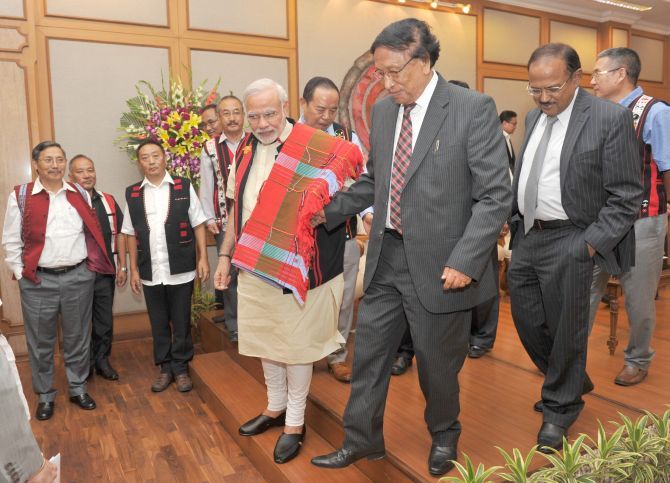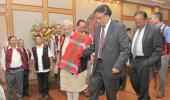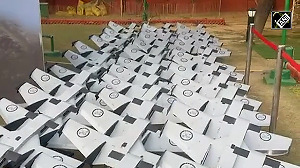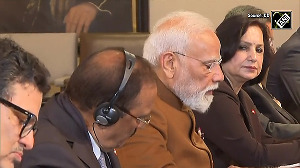Naga rebel groups remain divided over the pact. Moreover, the secrecy around the accord creates apprehension in society. K Anurag reports

There has been hardly any jubilation or discernible enthusiasm among people in Nagaland over the peace accord (rather a framework of agreement for bringing about peace) that the National Socialist Council of Nagaland-IM leadership led by Isaac Swu and Thuingaleng Muivah signed with the government of India earlier this week.
A studied silence has been maintained by civil society leaders and various non-government organisations in Nagaland. They don’t yet know what exactly has been agreed upon by the NSCN-IM and the government and how the accord will deal with other rebel groups like the NSCN-Khaplang, NSCN Khole-Kitovi, Naga National Council, NSCN (unification), NSCN (Reformation). The Khaplang-led faction's acceptance of the peace accord is vital for achieving lasting peace in the plural tribal society of Nagaland. The group was behind the ambush of the army unit in Manipur this June which left 18 soldiers dead. Khaplang is said to control a huge underground network from Myanmar and heads a newly floated United National Liberation Front of Western South-East Asia that includes five more rebel outfits from the northeastern region.
Sitting at Camp Hebron, the headquarters of NSCN-IM about 40 kilometres from Dimapur, Rh Raising, home minister of the group‘s ‘Government of the People’s Republic of Nagalim’, said, “The NSCN-IM is the only mandated organisation. It is formed and mandated by the people.”
But the ground reality is not as simple as that given the prevailing differences among various Naga political groups.
NSCN-K, which is the sworn rival of NSCN-IM, has broken silence over the much talked about Naga peace accord stating that even if Muviah signed the pact, they (NSCN-K) are under no obligation to “either agree or disagree”. The accord was intended exclusively for the NSCN-IM, they added.

Alezo Venuh, a representative of the collective leadership of NSCN-Khole-Kitovi, a faction led by Khole Konyak and Kitovi Zimomi, said, “Our group had nothing to do with it (the accord), as it is for Muivah. The NSCN-Khole-Kitovi has no problem with Naga peace accord if the agreement was good for Muviah and southern Nagas (from Manipur)”.
It is worth mentioning that Muivah is a Tangkul Naga from Manipur. According to Alezo, Muviah had signed an accord which would be “good” for the Nagas living in “southern Nagaland” (Manipur).
As for the Nagas of Nagaland, Alezo said, “The NSCN-Khole-Kitovi would seek a political settlement or solution with the people’s consultation.” He pointed out that “it is just an accord” and not a “political agreement or settlement” adding that the government of India couldn’t just undermine NSCN-Khole-Kitovi given the movement was over 60 years old and that it did not belong to any individual or organisation.
Naga Hoho, the apex civil society body of the Nagas, has appealed to the government and the NSCN-IM to share the contents of the “framework agreement”.
The Hoho welcomed the agreement as “the foundation towards bringing a lasting solution to the protracted Indo-Naga political problem”.
During its executive meeting held at Kohima on Thursday, the society discussed the agreement at length. While observing that people at large were becoming apprehensive and impatient. It appealed to each and every Naga “not to be swayed by rumours through social media, but to be persistent about the best interests of the Naga people”.
Rediff recommends:
From our archives: The Thuingaleng Muivah interview










